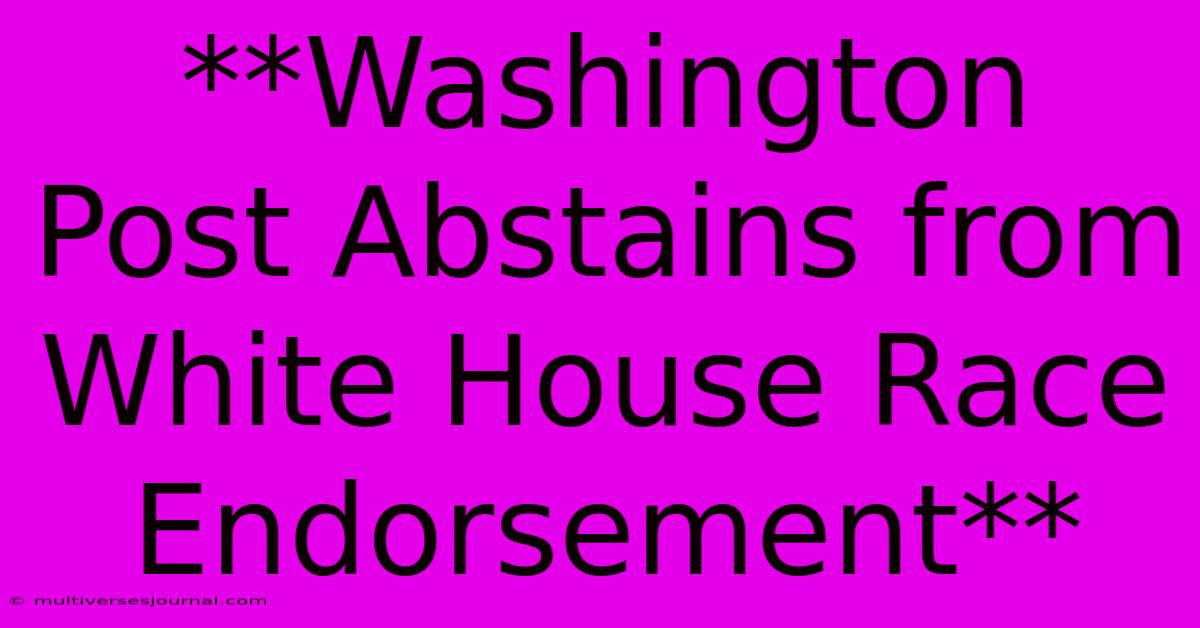**Washington Post Abstains From White House Race Endorsement**

Discover more detailed and exciting information on our website. Click the link below to start your adventure: Visit Best Website multiversesjournal.com. Don't miss out!
Discover more detailed and exciting information on our website. Click the link below to start your adventure: Visit Best Website mr.cleine.com. Don't miss out!
Table of Contents
The Washington Post Breaks Tradition: No Endorsement for the 2024 White House Race
The Washington Post, a renowned American newspaper with a long history of political endorsements, has made a surprising decision for the 2024 presidential election: it will not endorse a candidate. This move marks a significant departure from the publication's traditional practice, sparking discussions about the changing role of media in political discourse.
A Shift in Editorial Strategy
The Post's decision was announced in an editorial published on [Date of announcement], where the newspaper explained its rationale for the change. The editorial states that the current political climate, characterized by extreme polarization and distrust in institutions, makes it "difficult to see how an endorsement would be helpful."
The Post further argues that its primary responsibility is to provide readers with accurate and comprehensive coverage of the election, allowing them to make informed decisions without undue influence.
A Broader Trend in Journalism?
The Washington Post's decision reflects a broader trend among media outlets, particularly those with a strong journalistic ethos. Some argue that endorsements, regardless of their intentions, can be perceived as partisan and undermine the credibility of the media. In a landscape where trust in institutions is already fragile, some believe that abstaining from endorsements can help maintain a more neutral and objective position.
Implications for the 2024 Election
The Post's decision is likely to have a ripple effect on other media outlets considering endorsements for the 2024 election. While some may follow suit, others may continue the tradition, citing their responsibility to guide voters towards what they believe are the best candidates.
The absence of a major publication like the Washington Post from the endorsement landscape will undoubtedly change the dynamics of the campaign. It remains to be seen how this will impact voter choices and the overall discourse surrounding the election.
The Future of Media Endorsements
The Washington Post's decision raises important questions about the future of media endorsements in a rapidly evolving media landscape. As audiences become increasingly fragmented and information is more readily available through various platforms, it is possible that endorsements will become less influential. Alternatively, they could evolve to take on new forms, perhaps through more nuanced and analytical approaches that focus on policy rather than personalities.
Regardless of the future trajectory, the Washington Post's decision highlights the growing complexities of the relationship between media and politics in the 21st century.

Thank you for visiting our website wich cover about **Washington Post Abstains From White House Race Endorsement** . We hope the information provided has been useful to you. Feel free to contact us if you have any questions or need further assistance. See you next time and dont miss to bookmark.
Thank you for visiting our website wich cover about **Washington Post Abstains From White House Race Endorsement** . We hope the information provided has been useful to you. Feel free to contact us if you have any questions or need further assistance. See you next time and dont miss to bookmark.
Featured Posts
-
Remembering Dj Clark Kent 1965 2023
Oct 26, 2024
-
Bruins Face Penalty Problem In Early Games
Oct 26, 2024
-
Penalty Trouble Bruins Top Issue To Address
Oct 26, 2024
-
Bruins Confident Despite Seasons Slow Pace
Oct 26, 2024
-
Penalties Plague Bruins In Early Season
Oct 26, 2024
